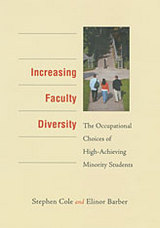
In recent years, colleges have successfully increased the racial diversity of their student bodies. They have been less successful, however, in diversifying their faculties. This book identifies the ways in which minority students make occupational choices, what their attitudes are toward a career in academia, and why so few become college professors.
Working with a large sample of high-achieving minority students from a variety of institutions, the authors conclude that minority students are no less likely than white students to aspire to academic careers. But because minorities are less likely to go to college and less likely to earn high grades within college, few end up going to graduate school. The shortage of minority academics is not a result of the failure of educational institutions to hire them; but of the very small pool of minority Ph.D. candidates. In examining why some minorities decide to become academics, the authors conclude that same-race role models are no more effective than white role models and that affirmative action contributes to the problem by steering minority students to schools where they perform relatively poorly. They end with policy recommendations on how more minority students might be attracted to an academic career.

The sociology of science is dominated today by relativists who boldly argue that the content of science is not influenced by evidence from the empirical world but is instead socially constructed in the laboratory. Making Science is the first serious critique by a sociologist of the social constructivist position.
Stephen Cole begins by making a distinction between two kinds of knowledge: the core, which consists of those contributions that have passed the test of evaluation and are universally accepted as true and important, and the research frontier, which is composed of all work in progress that is still under evaluation. Of the thousands of scientific contributions made each year, only a handful end up in the core. What distinguishes those that are successful?
Agreeing with the constructivists, Cole argues that there exists no set of rules that enables scientists to certify the validity of frontier knowledge. This knowledge is “underdetermined” by the evidence, and therefore social factors—such as professional characteristics and intellectual authority—can and do play a crucial role in its evaluation. But Cole parts company with the constructivists when he asserts that it is impossible to understand which frontier knowledge wins a place in the core without first considering the cognitive characteristics of the contributions. He concludes that although the focus of scientific research, the rate of advance, and indeed the everyday making of science are influenced by social variables and processes, the content of the core of science is constrained by nature. In Making Science, Cole shows how social variables and cognitive variables interact in the evaluation of frontier knowledge.
READERS
Browse our collection.
PUBLISHERS
See BiblioVault's publisher services.
STUDENT SERVICES
Files for college accessibility offices.
UChicago Accessibility Resources
home | accessibility | search | about | contact us
BiblioVault ® 2001 - 2024
The University of Chicago Press









